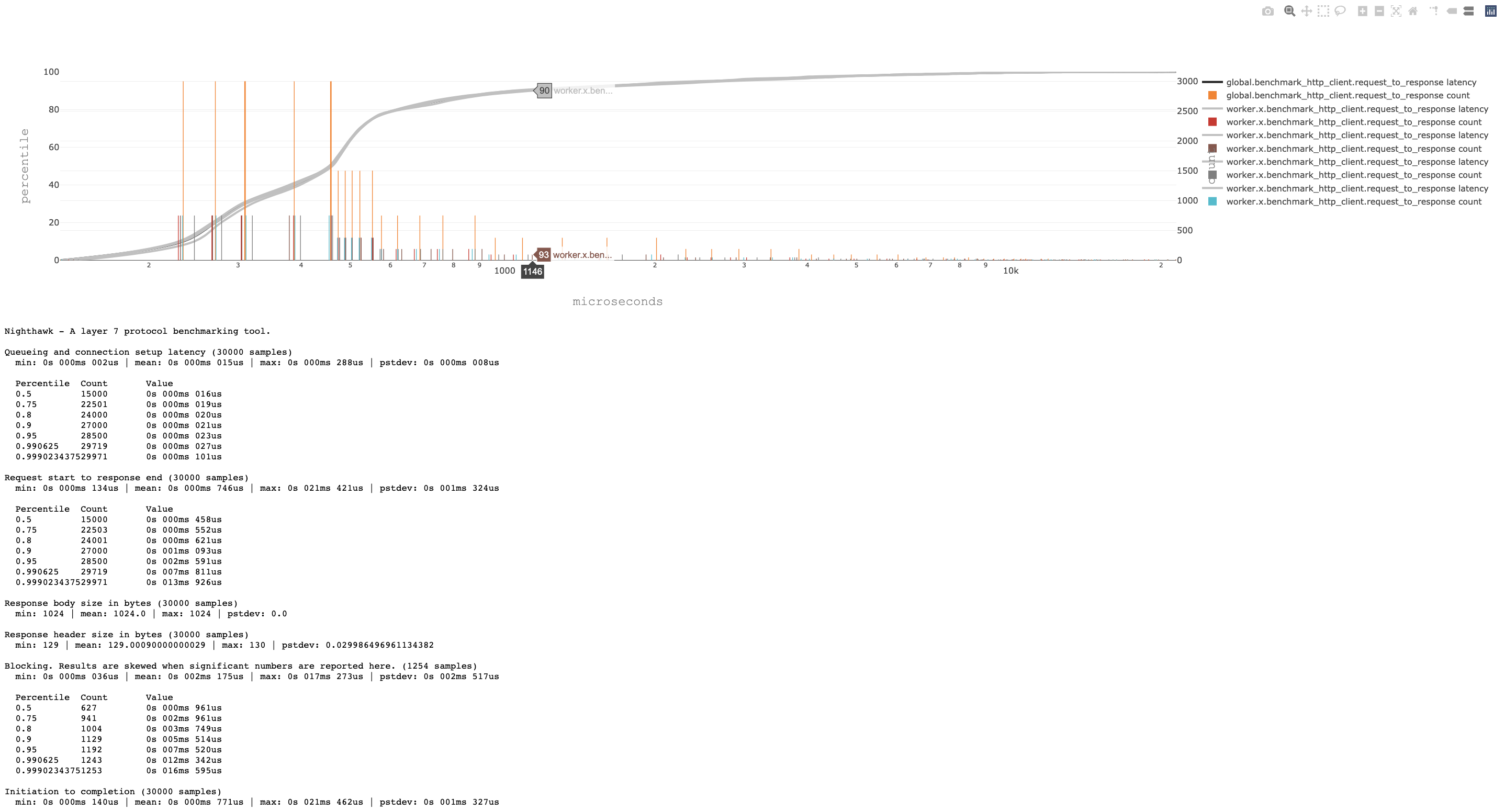The NH benchmark test suite builds on top Nighthawk's integration test framework, and can be used to scaffold tests and obtain latency reports as well as flamegraphs.
The goal is to be able to:
- facilitate integration into CI flows (via fully dockerized flow)
- facilitate A/B testing by developers
- run the suite against arbitrary Envoy revisions
- persist profile dumps, flamegraphs, and latency numbers per test
- offer stock tests, but also allow scaffolding consumer-specific tests
The benchmark will drop a visual in each test directory.
This scripts shows how to use the benchmarking suite.
It will run a selection of an example static benchmarks
extracted from /benchmarks, which injects Envoy between the benchmark client and test server.
It will also run an example dynamic
benchmark which adds dynamic
configuration of the Envoy.
git clone https://github.com/envoyproxy/nighthawk.git benchmark-test
cd benchmark-test
bazel build //benchmarks:*
# Specify the ip address family we'll be using. [v4only|v6only|all]
export ENVOY_IP_TEST_VERSIONS=v4only
# Explicit tmpdir for OSX Docker, to make sure we'll use a volume that works when
export TMPDIR="$(pwd)/benchmarks/tmp"
# Nighthawk tools will be sourced from this Docker image
export NH_DOCKER_IMAGE="envoyproxy/nighthawk-dev:latest"
# Envoy Docker image that we'll use to inject the Envoy proxy
export ENVOY_DOCKER_IMAGE_TO_TEST="envoyproxy/envoy-dev:74290ef76a76fbbf50f072dc33438791f93f68c7"
# Envoy is called 'Envoy' in the Envoy Docker image.
export ENVOY_PATH="envoy"
# run all static configuration benchmark tests starting with test_http_h1_small in benchmarks/
bazel-bin/benchmarks/static_benchmarks --log-cli-level=info -vvvv -k test_http_h1_small benchmarks/test/
# run all dynamic configuration benchmark tests
bazel-bin/benchmarks/dynamic_benchmarks --log-cli-level=info -vvvv benchmarks/dynamic_test/This will build the Nighthawk binaries from the C++ code, and use those to
execute the benchmarks. Environment variable ENVOY_PATH can be used to
specify a custom Envoy binary to use to inject as a proxy between the test
client and server. If not set, the benchmark suite will fall back to configuring
Nighthawk's test server for that. Note that the build can be a lengthy process.
git clone https://github.com/envoyproxy/nighthawk.git benchmark-test
cd benchmark-test
bazel test \
--test_summary=detailed \
--test_output=all \
--test_arg=--log-cli-level=info \
--test_env=ENVOY_IP_TEST_VERSIONS=v4only \
--test_env=HEAPPROFILE= \
--test_env=HEAPCHECK= \
--cache_test_results=no \
--compilation_mode=opt \
--cxxopt=-g \
--cxxopt=-ggdb3 \
--define tcmalloc=gperftools \
//benchmarks:*The framework can be run via Docker and used that way to execute Python benchmarks scripts not sourced from this repository, but elsewhere. An example:
# This script runs the dockerized benchmarking framework, which in
# turn will pull Nighthawk and Envoy in via Docker.
set -eo pipefail
set +x
set -u
# The benchmark logs and artifacts will be dropped here
OUTDIR="/my-artifacts-dir/"
# Used to map the test that we want to see executed into the Docker container
# Note: the contents could be fetched via http, for example.
TEST_DIR="/dir-that-has-my-tests/"
# Rebuild the Docker in case something changed.
./docker_build.sh &&
docker run -it --rm \
-v "/var/run/docker.sock:/var/run/docker.sock:rw" \
-v "${OUTDIR}:${OUTDIR}:rw" \
-v "${TEST_DIR}:/usr/local/bin/benchmarks/benchmarks.runfiles/nighthawk/benchmarks/external_tests/" \
--network=host \
--env NH_DOCKER_IMAGE="envoyproxy/nighthawk-dev:latest" \
--env ENVOY_DOCKER_IMAGE_TO_TEST="envoyproxy/envoy-dev:f61b096f6a2dd3a9c74b9a9369a6ea398dbe1f0f" \
--env TMPDIR="${OUTDIR}" \
envoyproxy/nighthawk-benchmark-dev:latest ./benchmarks --log-cli-level=info -vvvv- Copy out the artifacts and push those to a gcp bucket. Current status:
- cpu profiles are dumped to tmp per test (named according to the test). ideally we'd also dump flamegraph svg's
- Enhance the UI. Currently we rely on CI to directory-list our artifacts. This is is pretty bare-bones, ideally we'd have something more fancy and we would be able to visualize test data historically.
- Use taskset/cpuset when starting processes.
- Offer a docker image with binaries pre-built for profiling + the python test framework.
- Multi-origin support. The integration tests support it, but this isn't fitted into the benchmark framework yet. This might just be a doc issue.
- The current status can collect CPU profiles, but these are useless without access to the binary & libs that have been involved in producing them.
- profiling / flamegraphing via perf/bcc tools
- Allow injection of other proxies: nginx, haproxy
- Allow using alt clients, like Fortio & wrk2
- An app that integrates fortios UI, pprof's web UI
- Have a mode where nighthawk_test_server provides high-res control timings in its access logs
- The ability to repeat the runs multiple times and obtain stats, e.g. how much variance there is, mean, etc.
- The ability to do A/B testing, similar to https://github.com/envoyproxy/envoy-perf/blob/main/siege/siege.py#L3.
